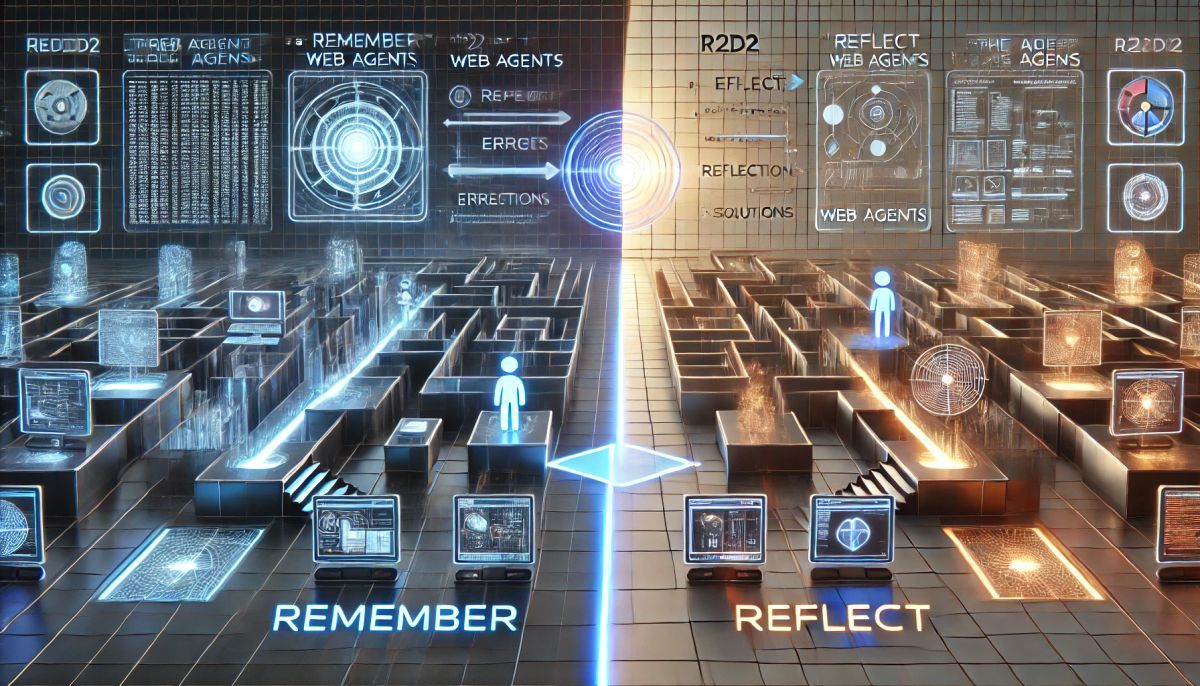In the rapidly evolving landscape of artificial intelligence, web agents have become indispensable tools for automating online tasks. However, these agents often struggle with efficient navigation and action execution in complex web environments. Enter R2D2 (Remembering, Reflecting, and Dynamic Decision Making), a groundbreaking framework that promises to transform the capabilities of web agents.
The Challenge of Web Navigation
Web agents are designed to perform a wide range of tasks, from customer service to data retrieval and personal assistance. Despite recent advancements, these agents frequently encounter difficulties when navigating intricate web structures. The primary reasons for this are:
- Limited visibility of action consequences
- Rapid forgetting of valuable experiences
- High rate of navigation-related failures (approximately 60% of operational errors)
These challenges have long been modeled as an Unknown Markov Decision Process (MDP), where agents operate with incomplete information about their environment1
Introducing R2D2: A Paradigm Shift
R2D2 addresses these challenges by introducing two innovative paradigms: Remember and Reflect. This approach transforms web navigation from an Unknown MDP to a Known MDP, significantly enhancing the agent's decision-making capabilities.
The Remember Paradigm
At the heart of R2D2 is the Remember paradigm, which utilizes a structured replay buffer to store the agent's experiences. This buffer acts as a dynamic map of the web environment, allowing the agent to:
- Record and recall previously visited pages
- Construct a well-organized search space
- Identify reliable navigation routes to target resources
By converting the agent's experience into a structured format, R2D2 reduces computational overhead and avoids unproductive exploration.
The Reflect Paradigm
Complementing the Remember paradigm is the Reflect paradigm, which enables continuous improvement based on both successes and failures. Unlike previous approaches that focus primarily on immediate, execution-level errors, R2D2's reflection mechanism:
- Minimizes navigational missteps
- Identifies and corrects subtle issues in task execution
- Operates more effectively on remaining execution problems
This dual approach leads to a higher overall success rate on complex web tasks.
R2D2 in Action: A Technical Overview
The R2D2 framework operates through several key components:
- Replay Buffer Construction: The Remember paradigm builds a directed graph representing the web environment, with nodes as webpage observations and edges as actions
- A Search Algorithm*: R2D2 employs an advanced A* search strategy within the replay buffer, using a heuristic provided by a Large Language Model (LLM) to guide the search towards relevant webpages
- Error Categorization: The framework distinguishes between navigation failures and execution failures, allowing for targeted improvements
- Reflective Memory: Successful and corrected trajectories, along with their rationales, are stored in a reflective memory for future reference
- Retrieval Mechanism: A retriever leverages the reflective memory to select relevant corrected trajectories as in-context demonstrations, continually improving the agent's performance
Impressive Results and Future Implications
When evaluated using the WEBARENA benchmark, R2D2 demonstrated remarkable improvements over existing methods:
- Approximately 50% reduction in navigation errors
- Threefold increase in overall task completion rates
- 17% outperformance of state-of-the-art methods
These results showcase R2D2's robust capability for executing complex web-based tasks, potentially revolutionizing applications such as automated customer service and personal digital assistants.
Conclusion: A New Era for Web Agents
R2D2 represents a significant leap forward in the field of web agents. By combining memory-enhanced navigation with reflective learning, this framework addresses longstanding challenges in web interaction and task execution. As we move towards more sophisticated AI systems, R2D2 paves the way for more efficient, reliable, and capable web agents that can handle increasingly complex online tasks with human-like proficiency.
The implications of this research extend far beyond simple web navigation. As AI continues to integrate into our daily lives, frameworks like R2D2 will play a crucial role in developing more intuitive and effective digital assistants, enhancing our interaction with the digital world in ways we're only beginning to imagine.
